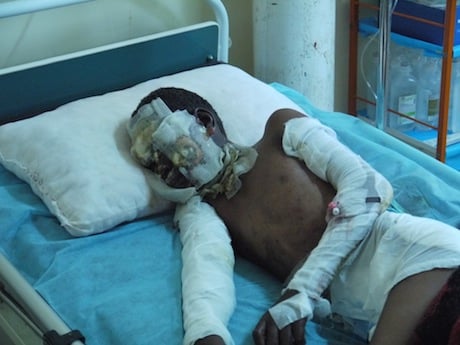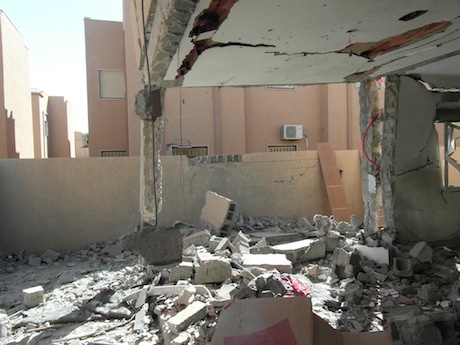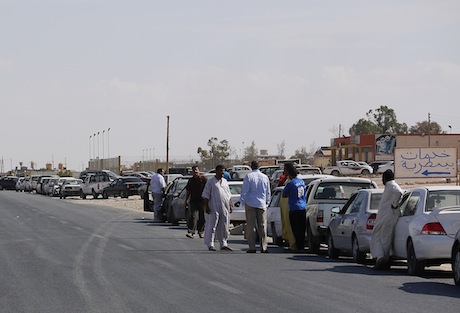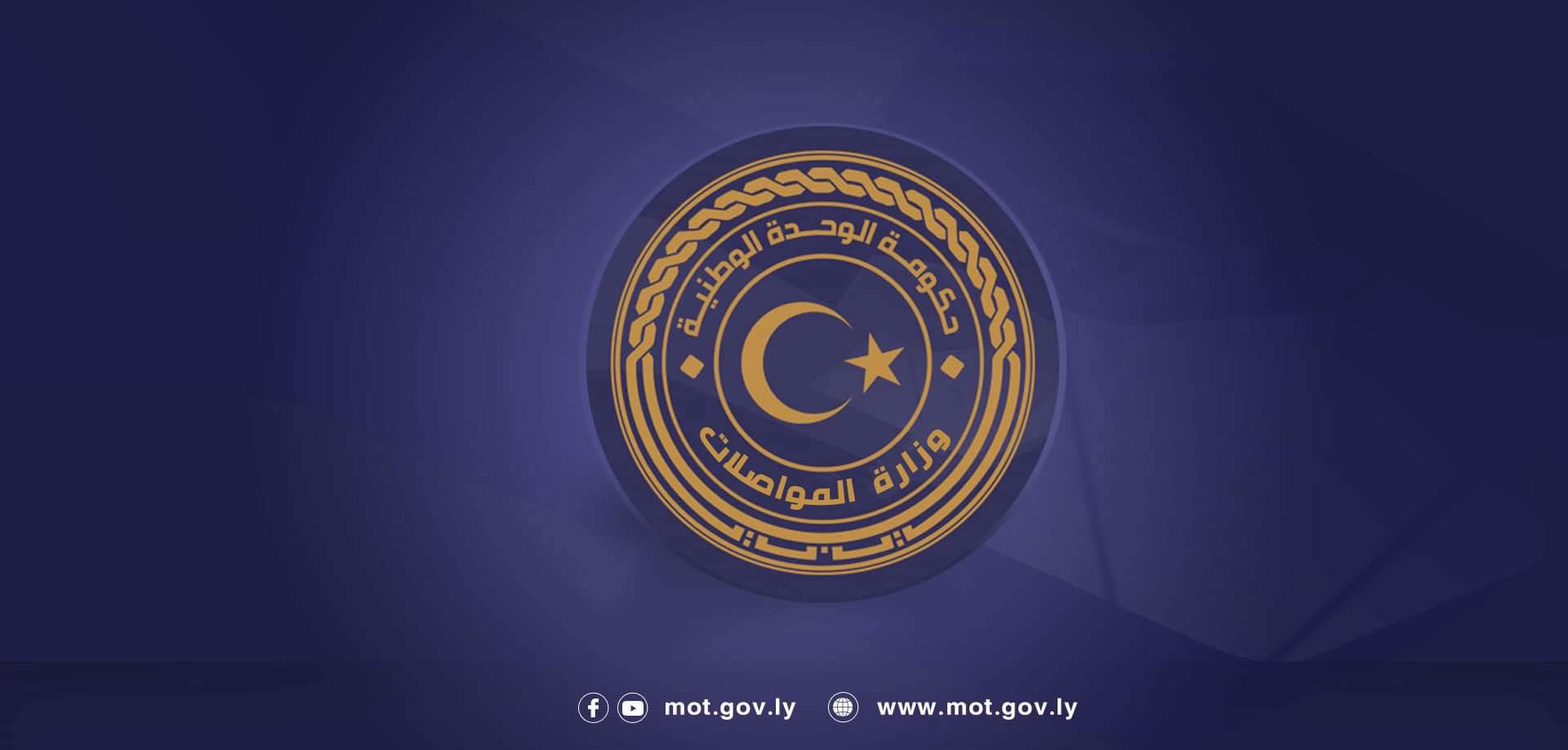By George Grant and Mathieu Galtier.

Bani Walid, 10 October:
Government forces stationed at Bir Dufan have been accused of using gas on . . .[restrict]civilians from Bani Walid during an attack that took place on Monday.
Following two visits to the town, the Libya Herald learned that 26 patients had been admitted to hospital with symptoms including hallucinations, foaming at the mouth, muscle spasms, coughing, eye irritations, dizziness, breathing difficulties and loss of consciousness.
A further 30 people were wounded following bombardments that took place on Sunday and Monday, in which Grad rockets and tanks were allegedly used. Three of the patients remain in a serious condition, including a 12-year old boy and his 16-year old sister, who are suffering from severe burns.
The attacks were primarily focused on the Mordum area, some 20 kilometres northeast of Bani Walid, although a few buildings were hit in the town itself.
Clashes also took place in Mordum on 2 October, shortly after government forces took up positions at four separate locations surrounding Bani Walid. One man was killed, named locally as Muammar Dammi, whilst several others were injured.
“We started receiving patients with strange symptoms that I have not seen before”, said Taha Mohammed, a doctor at Bani Walid hospital, in reference to Monday’s attack.
“Those affected were having difficulty breathing, reported dizziness and were coughing. Not everybody displayed the same symptoms, but some were also suffering from hallucinations, foaming at the mouth and loss of consciousness. We believe they had been exposed to some sort of gas”.
Mohammed said he had been unable to identify precisely what kind of gas, if any, was used, as the hospital did not possess the necessary equipment.
A doctor’s note from the hospital dated 8 October listed a number of the aforementioned symptoms, adding that “the response of those patients to routine medical treatments was slow and incomplete, which makes the inhalation of toxic gas a very strong possibility. All of them are very well and healthy individuals with no history of heart or lung diseases before this occasion.”
It remains a possibility that residents were exposed to emissions from a facility that may have been hit during the bombardment as opposed to directly from the munitions themselves.
“I heard an explosion, my eyes became irritated and my mouth dried up”, said Ramadan Sahad Ramadan, one of the patients said to have been exposed to the gas, who also showed signs of breathing problems.
“I saw many tanks, I heard a big explosion and then I woke up in the hospital”, said Abubaker Sudani, another patient, who had no external injuries resulting from the blast. “I have difficulty breathing, I cannot see properly and I have thrown-up”.
Responding to the allegations, Colonel Ali Sheikhi, a spokesman for Chief of Staff General Yusuf Mangoush, denied that any gas had been deployed against the town.
“No gas has been used against Bani Walid”, he said. “We do not possess any such weapon”.
Sheikhi stated, however, that Mangoush had not authorised the recent actions against Bani Walid, effectively conceding that the forces at Bir Dufan had acted unilaterally.
One soldier stationed at Bir Dufan confirmed that an attack had taken place but also denied that any gas was used.
“We don’t have any gas”, said the Misratan, who requested to remain anonymous. “We don’t have that and we wouldn’t use that against civilians.
“You saw what we had with your own eyes when you came. We have some Grads up front, a few tanks, and the vehicles [flat-bed pick-up trucks fitted with machine guns and mounted rocket launchers].”
The soldier said that their forces had also come under attack from Bani Walid, but could not verify which side had fired first.
Inside Bani Walid, the Libya Herald was able to visit the house in which the two children seen at the hospital were hit. Located on the southwest side of the town, large holes had been blown in the side of the walls by the explosion, resulting in significant quantities of fallen debris.

“It happened at around 9am on Sunday, said Zaynab Hamid, the sister of the two children. “We heard the sound of guns, and as soon as we tried to hide, the shell hit the house.”
Hamid, whose family are refugees from Tawergha, said that she believed the blast was caused by a Grad rocket, but could not be certain if that was the weapon used. Her mother was also lightly injured in the explosion.
To date it is only forces from the Bir Dufan camp, the majority of whom hail from Misrata, that have been engaged in clashes with Bani Walid.
On Sunday, forces on the road from Tarhuna withdrew altogether, reportedly after commanders decided they wished to play no further part in the siege.
The two remaining camps, on the road from Sirte to the east and from the Nafusa Mountains to the south, are said to still be in place but have not attempted to engage with Bani Walid as yet.
The catalyst for the current standoff was the death of Omran Shaban, the Misratan revolutionary credited with first discovering Muammar Qaddafi last October, who died in a hospital in Paris on 25 September.
Together with a colleague, he was captured in Bani Walid in July and held for two months before being released on 13 September following mediation efforts led by National Congress President Mohamed Magarief.
It is known that he was shot in the spine, reportedly after the vehicle in which he was travelling failed to stop at a checkpoint and then rolled over. There have also been widespread allegations that Shaban was tortured whilst in custody, although this is vehemently denied by Bani Walid leaders who say that he was treated in hospital and visited by the Red Cross.
Today, a Red Cross spokeswoman currently visiting Bani Walid to distribute humanitarian supplies refused to offer any comment on whether evidence of torture against Shaban had been found or not.
Nevertheless, Shaban’s death prompted a resolution [Law no.7] from the National Congress giving Bani Walid ten days to surrender those suspected of involvement in the case and authorising the ministries of defence and interior to use force if the town did not comply.
That deadline was subsequently pushed back to 10 October, today, following a request by Magarief to allow more time for negotiations. Libya’s military commanders have said that should the deadline pass without a resolution then an attack remains a possibility.
“After the passing of the deadline today, General Mangoush will make a decision on whether or not to attack following consultations with political leaders and his field commanders”, Colonel Sheikhi said.
The likelihood of the suspects being handed over before midnight is virtually non-existent, however, since leaders in Bani Walid say that no investigation to try and find the suspects has even begun.
“We do not know who the suspects are”, said Mohammed Barguti, the head of Bani Walid’s de facto ruling council. “Law no.7 is wrong and puts us in an impossible position. Before this law was passed, nobody came here to investigate what was really going on. All these decisions have been taken by people far away and that is unacceptable”.
Barguti said that he would have no objections to police coming from outside Bani Walid to investigate the incident, but said that no such offer had been made.

“The problem is that the state is still very weak”, he said. “There is no proper judiciary and no proper police. We have said to Magarief that Bani Walid is under the authority of Libya and accepts the new system. However, there is nothing we can do until all the government institutions are working properly”.
Barguti said that if there was an attack on Bani Walid it would come from Misrata, not on the orders of the government. “The government is trying to find a peaceful resolution. They are trying to stop Law no.7, which is why they are having to negotiate with Misrata as well as us.”
Another leader on the council, Muftar Abduljabar, insisted that the case was fundamentally a judicial matter, not a military one, and that any attack on Bani Walid should be considered illegal.
“Law no.7 is ludicrious. It is the judiciary, not the Congress, who should be responsible for such matters. There are perhaps 200 prisoners from Bani Walid being held in Misrata, but nobody is threatening to go to war over them”.
Local residents have said they are ready to fight if attacked, but remain hopeful that a peaceful resolution can be achieved. Following a lengthy blockade of some ten days, supplies began trickling back into the town yesterday along the Tarhuna road, including food, fuel and some medical supplies from private donors.
“Bani Walid does not want to fight with anybody”, said Ahmed Almaried, a local businessman. “It just wants to be left in peace”. [/restrict]









